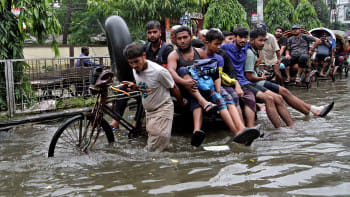SMEs hit hard by August floods need govt assistance to survive

The devastating floods in August and the following months have made life miserable for dairy and livestock farmers, as well as small entrepreneurs, who are now struggling to meet operational expenses and repay bank loans after losing most of their belongings.
Some businesses and homes have been directly damaged by the floods while others have experienced a sharp decline in sales, according to the entrepreneurs and the leaders of business associations.
Nazma Akhter, an entrepreneur from Begumganj Upazila in Noakhali district, has lost 10 of the 50 cows of her farm, which was submerged under three feet of water during the recent floods.
The businesswoman told The Daily Star that the floods have caused her over Tk 10 lakh in losses.
"I have been running the farm with loans from various banks and nongovernmental organisations. But I couldn't sell a single drop of milk in the past one month, which have compounded my financial difficulties."
"So far, there has been no government support. Without it, I may have to shut down the farm."
Similarly, Rahima Bibi, an entrepreneur from Sadar Upazila in Noakhali, said the floods have washed away all the fishes and ducks of her pond and farm, causing an estimated loss of Tk 1.25 crore.
The 55-year-old said she had plans to repay about Tk 1 crore in loans taken from Janata Bank, Mercantile Bank and 10 NGOs by selling fishes in November and December.
She had also planned to use her farm's earnings for her daughter's wedding.
"But the floods have put me in great danger. How can I now pay the instalments of bank and NGO loans? It is impossible to recover if the government does not cooperate," she said in a voice filled with distress.
To highlight the gravity of the damages, the disaster management ministry and the Centre for Policy Dialogue (CPD) have released separate reports.
In both the reports, the amount of financial loss was mentioned to be over Tk 14,000 crore.
The sudden August floods have claimed 74 lives and injured 68 others nationwide, according to the disaster management ministry.
The ministry calculated the financial toll based on damages to agriculture, housing, roads, and overall infrastructure across 11 districts in the eastern part of the country, with Feni being the worst affected.
Some 9.43 lakh people were affected by the floods and half of them were displaced from their homes and sought shelters elsewhere, it said.
The CPD, in its study, said the government would need to increase its budget for relief distribution.
The think-tank said the damage was equivalent to 1.81 percent of the national budget and 0.26 percent of the country's projected gross domestic product (GDP) for 2024-25 fiscal year.
The floods, triggered by heavy rainfall and upstream hill runoff, began on August 20 this year and rapidly spread through districts such as Feni, Cumilla, Chattogram, Khagrachhari, Noakhali, Moulvibazar, Habiganj, Brahmanbaria, Sylhet, Lakshmipur, and Cox's Bazar.
Despite the widespread damage, flood victims in Mymensingh, Sherpur, and Netrokona are reportedly suffering from insufficient relief supplies and a lack of drinking water.
Flash floods have stranded 280,000 people in these districts, according to the data of the local administration.
The agriculture and fishing sectors have been particularly hard-hit in these regions.
Anwar Hossain, the owner of a light-engineering workshop from Station Road in Cumilla district, described how the floods have affected his business.
Before the disaster, Hossain used to sell over Tk 1 lakh worth of goods daily, which plummeted to Tk 20,000 to Tk 30,000 because of the damages caused to the agricultural lands.
"I am now struggling to cover my workshop's monthly expenses, pay bank loan instalments, and make interest payments."
Another entrepreneur from the same area, Mohammad Arif, who manufactures autorickshaws, reported that his sales have dropped by about 30 percent due to the floods.
Tapas Kumar Paul, president of the Rudra Paul Pottery Cooperative Society in Bijoypur of Cumilla, said the floods have destroyed the raw materials, stocks and homes of the pottery makers in four villages.
The members of the association have counted losses of around Tk 35 lakh, Paul said, urging the government to assess the volume of the losses and extend immediate assistance to the affected businesses.
Sajol Borakurmi, president of the Rangichhara Cooperative Society in Kulaura Upazila in Moulvibazar, said collecting loan repayments has become extremely challenging.
"Most customers are now unable to pay their instalments and there is also a rush among people to take loans to repair their homes," he said.
After the floods, a team from the SME Foundation visited the affected districts, including Cumilla, and hand over a report to the industries ministry after gathering recommendations from the entrepreneurs.
The small and medium enterprises are considered the lifeline of Bangladesh's economy, contributing about 25 percent of the country's GDP, said the state-owned organisation responsible for promoting small enterprises.
The foundation, in its report, said raw materials, stock products and houses of many SME entrepreneurs have been damaged while many traders were not directly affected.
The businesses which used to procure goods from the SMEs in the agricultural sector have seen their sales to fall by about three-fourths, it said.
The foundation suggested that banks and financial institutions halt loan instalment collections, waive interest on loans, provide financial incentives to victims, offer low-cost loans with flexible terms, and take steps to expand market opportunities.
The affected SMEs would face long-term financial difficulties if they are not provided with immediate support, it warned.
Anwar Hossain Chowdhury, managing director of the SME Foundation, said the SMEs have faced numerous challenges due to the political unrest starting from June this year, followed by two rounds of flooding.
The foundation requested Bangladesh Bank to ask banks to refrain from imposing fines or extra interest on businesses in case of failure to repay loans in time.
Our Moulvibazar correspondent contributed to this report.


 For all latest news, follow The Daily Star's Google News channel.
For all latest news, follow The Daily Star's Google News channel. 





Comments